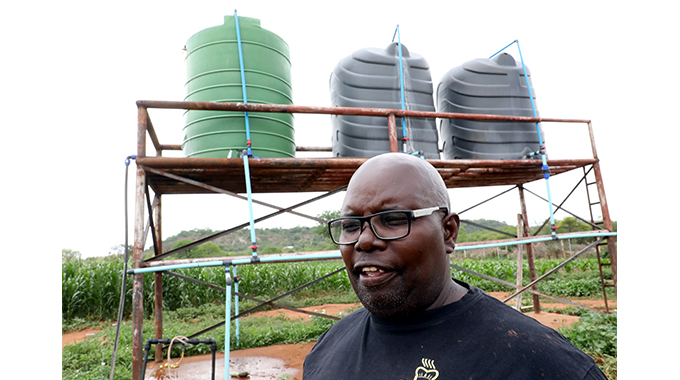Retrenchee basks in horticulture farming rich pickings

Mashudu Netsianda, Senior Reporter
WHEN Mr Sihlangu Dlodlo (56) got retrenched early this year, the first thing to cross his mind was his neglected arable piece of land in Bubi District, Matabeleland North, acquired under the Government-sponsored land reform programme.
The land measuring 10 000 square metres (one hectare) has been lying idle for years despite rich soils.
Mr Dlodlo was employed by Innscor as sales manager before his retrenchment in February.
Instead of mourning over his job loss, Mr Dlodlo turned to farming. He used his retrenchment package including proceeds realised from the sale of 27 beasts to drill boreholes and set up a drip irrigation project at his homestead in Esiphikweni (formerly Sailors Hope Farm).
Today, he prides himself in being one of the successful horticulture farmers in the area.
Like the famous King Midas, popularly remembered in Greek mythology for his ability to turn everything he touched into gold, Mr Dlodlo, believes whatever he touches turns green and his massive farming project has become an envy of many in Bubi.
He has transformed his entire plot into a thriving horticulture project, supplying Bulawayo markets with cabbages, green mealies, green pepper and beetroot.
The farming project, he says, has completely changed his life and it has also somewhat turned into a sanctuary for underprivileged local community members and extended family members.
“When I received my retrenchment letter, the first thing that struck my mind was my piece of land in Bubi, which was being under-utilised. So when my employer gave me my exit package, I immediately channelled the funds towards my farming project,” said Mr Dlodlo. “I also sold 27 beasts and managed to raise a total of US$15 000 and set up a drip irrigation project, piping and fencing. Today, when I look at my project, I have no regrets because it is doing wonders for me such that I am even taking care of members of extended family and I am also paying school fees for my three nieces at university.”
Mr Dlodlo has also created employment for his community. He employs five people on a permanent basis while 10 others are seasonal workers.
In August he planted 5 000 cabbages, 5 000 carrots and 15 000 onions, which are being fed through drip irrigation.
“I am using drip irrigation scheme and sadly some of the cabbages were a failure due to the soil texture. However, I did soil tests and discovered that there was a deficiency of nutrients which we are now correcting and I hope to plant 8 000 more cabbages this week,” said Mr Dlodlo.
“One of the critical things in business is cashflow and therefore it is important to be selling a product at any given time. The timing has been such that I have been selling cabbages and in a week’s time green mealies will ready for the market, and by the time I finish selling green mealies, beetroot and green pepper would be ready.”
Mr Dlodlo, who has been in the sales and marketing industry for more than 20 years, uses his vast experience to market his produce.
“I feel I have an obligation to assist my community through this project. At the moment, I sell my produce to the markets in Bulawayo while others are being sold locally. As a marketing strategy whenever I take the cabbages to the market, I sell a minimum of 200 cabbages per day at US$1 for three,” he said.
Three months ago, Mr Dlodlo planted the maize and in batches and hopes to harvest in stages. Mr Dlodlo firmly believes in the organic fertilisation of soil to strike the balance between the environment and the ecosystem.
“We also have mobile fowl runs which we put on the beds and droppings from the chickens act as manure which is another way of organic fertilisation of soil while also feeding chickens. We try to balance the ecosystem,” he said.
“I am trying to maintain that cycle so that there is constant cashflow, but the emphasis is to come up with a product of quality using as much of organic methods as possible so that we preserve the quality of the soils, environment and protecting workers because the more they are exposed to chemicals the riskier their work becomes.”
Mr Dlodlo has since adopted a local girl who is an orphan.
The girl passed her Ordinary Level with flying colours and he is now assisting her with school fees using proceeds from the farming project.
“When I posted on Twitter, there was also an overwhelming response from the public and we managed to mobilise funds and bought her uniforms and groceries and she is now doing Lower Six. I am staying with her,” he said. – @mashnets.










Comments